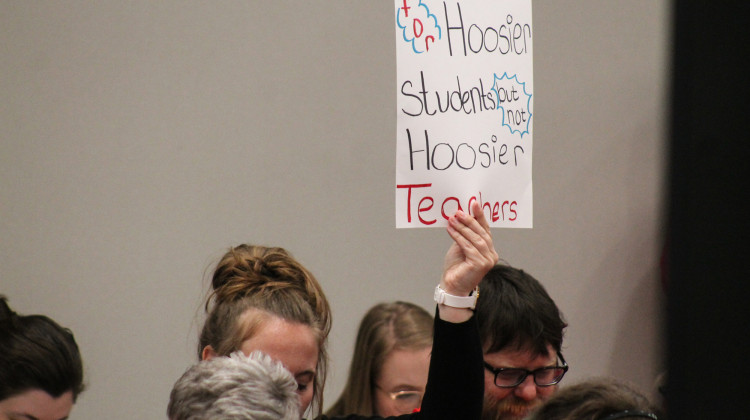
IDOE changed some aspects of the state's new literacy endorsement after educators expressed concern and frustration about the requirements.
Lauren Chapman / IPB NewsThe Indiana Department of Education is making changes to a new literacy endorsement after educators spoke out against the requirements. The department said it plans to offer more flexible training options, and it has adjusted which teachers will be required to get the endorsement.
The changes were announced in an IDOE email on Friday.
“In recent weeks, I have really appreciated listening and hearing from educators throughout our state,” said Indiana Secretary of Education Katie Jenner in the email. “I’m grateful for the collective effort to balance the urgent need to overcome Indiana’s literacy crisis with our shared desire to increase flexibility for educators.”
The changes come after educators spoke for nearly four and a half hours at a recent Indiana State Board of Education meeting. They described concerns about the requirements to receive a literacy endorsement and the state’s high school redesign.
The new endorsement requirements address specific concerns about which educators must receive the endorsement and their ability to attend courses during their non-contracted hours over the summer and on weekends.
Jennifer Smith-Margraf, vice president of the Indiana State Teachers Association, said the adjustments reflect many of educators’ concerns.
“They are making several of the changes that those folks have requested, most especially in terms of making sure that this is directed at folks who are actually teaching literacy in their classrooms in elementary schools,” she said.
The original requirements said all current preschool, elementary and special education teachers had to receive a literacy endorsement to renew their licenses after June 30, 2027.
According to the new requirements, educators with certain pre-K through sixth grade teaching licenses who do not teach literacy are no longer required to receive the endorsement to stay licensed. IDOE said only pre-K through fifth grade teachers who teach literacy instruction must complete the training.
The department said it will share a literacy endorsement exemption form for administrators to fill out before July 1, 2027. The form must be submitted during a teacher’s license renewal process.
READ MORE: Questions linger over Indiana's literacy endorsement stipends
Join the conversation and sign up for the Indiana Two-Way. Text "Indiana" to 765-275-1120. Your comments and questions in response to our weekly text help us find the answers you need on statewide issues.
IDOE also addressed concerns about the timing of training courses. Many teachers who spoke at the State Board of Education meeting said the previous requirements took up too much time outside working hours. Indiana teachers like Jessica Ketcham asked the IDOE to provide more flexibility for educators to complete the 80-hour course.
“Keys to Literacy offers an asynchronous option on their website,” Ketcham said. “The state should be allowing that to be an option so teachers can work at their own pace on their own time.”
Now, starting July 1, all 80 hours of the course can be completed asynchronously.
The Keys to Literacy course is not the only training educators can use to receive the endorsement. IDOE is currently working on a comprehensive list of eligible training options. The department also announced additional cohortsfor the Keys to Literacy course to help manage high demand.
Educators also spoke out against a content licensure exam they must pass to receive the endorsement. Evansville Teachers Association President Lori Young said she believes in professional development and staying updated on best practices, but the literacy exam will be especially burdensome on teachers.
“For many veteran teachers, they haven’t taken an exam like this in years,” she said. “I know firsthand. When I went from middle school up to the high school, I had to take Praxis for life science. I hadn’t taken an exam like that for 24 years. My stress level was out of control. Granted, I passed the test, but I’m also good at memorizing facts. That’s what the Praxis test was like for life science.”
IDOE said it is taking educators’ concerns about the exam into consideration.
“Concerns about the Praxis exam have been the most common … and also the most tricky to solve,” Jenner said in last Friday’s email. “We continue to work extensively to expand the number of training options that teachers can apply toward the 80-hour requirement, and as that list grows, the need for a consistent, quality measure becomes even more important.”
Jenner said IDOE chose the Praxis exam because of its strong alignment to the science of reading. However, she said she intends to create a team that will explore other ways to measure educators’ implementation of the science of reading in their classrooms.
Smith-Margraf said ISTA will continue to work with IDOE while advocating for the department to remove the requirement that educators pass an exam after completing the course altogether.
“It's our firm belief that if someone has gone through this coursework of 80 hours and has done all of the work and all the assessments that accompany that, that should be enough to prove that they are competent at doing this, and they should not have to do anything additional beyond that in order to prove their competency,” Smith-Margraf said.
Kirsten is our education reporter. Contact her at kadair@wfyi.org or follow her on Twitter at @kirsten_adair.
 DONATE
DONATE






 Support WFYI. We can't do it without you.
Support WFYI. We can't do it without you.